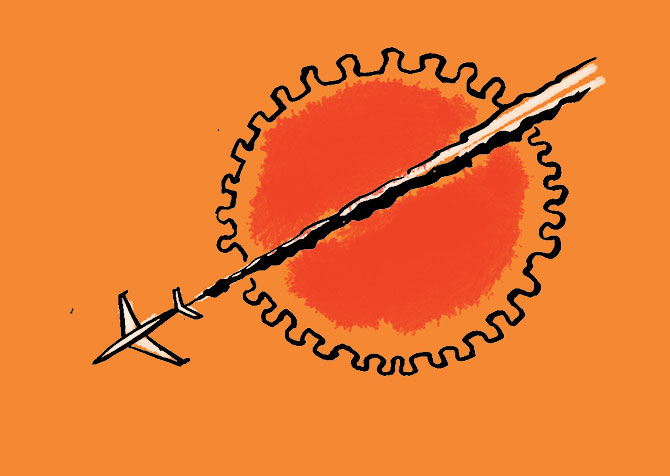These airports are those at Amritsar, Varanasi, Bhubaneswar, Indore, Raipur and Trichy.

The government will soon start auctioning of six more airports under public private partnership and additional investment by private players in total of 12 airports will be around Rs 13,000 crore, Finance Minister Nirmala Sitharaman said on Saturday.
Airports Authority of India (AAI) has already awarded three out of the six aerodromes that were bid out for operation and maintenance under public private partnership (PPP).
The announcement about airports was made as part of the fourth tranche of stimulus measures to bolster the country's economy that has been hit hard by the coronavirus pandemic and subsequent lockdown.
Sitharaman said annual revenue of the six airports would be around Rs 1,000 crore while the current profit is about Rs 540 crore per year.
Besides, AAI would get a down payment of Rs 2,300 crore.
Six more airports have been identified for bidding out and the bid process would commence immediately.
These airports are those at Amritsar, Varanasi, Bhubaneswar, Indore, Raipur and Trichy, according to an official.
Additional investments by private players in 12 airports in the first and second rounds are expected to be around Rs 13,000 crore, Sitharaman said.
Last year, the government bid out six airports -- Lucknow, Ahmedabad, Jaipur, Mangaluru, Thiruvananthapuram and Guwahati -- for operation, management and development through PPP model.
Another six airports will be put out for the third round of bidding, Sitharaman added.
State-owned AAI manages more than 135 airports and nearly 110 of them are operational.
Sitharaman also announced easing of restrictions on utilisation of Indian air space, benefiting civil aviation sector by about Rs 1,000 crore per year.
Announcing the fourth tranche of economic stimulus, she said only 60 per cent of Indian airspace is freely available.
More air space available would reduce travel time and save on fuel, she said.
Also, an additional investment of Rs 13,000 crore will be made by private players in 12 airports auctioned in first and second rounds.
She also said tax regime for aircraft Maintenance, Repair and Overhaul (MRO) has been rationalised.
Aircraft component repair and airframe maintenance are expected to increase from Rs 800 crore to Rs 2,000 crore in three years, she added.
"Not just civil aircraft but defence aircraft can also benefit from the MRO if we make India a huge hub ... Maintenance cost for all airlines will come down and that again will have a ripple effect on passengers. Travellers can probably pay less after that," she said.
The announcement was made by Sitharaman as part of the fourth tranche of stimulus measures to boost the economy amid the coronavirus pandemic.
She also announced auctioning of six more airports on public-private partnership (PPP) basis and taking steps for better utilisation of Indian airspace.
A competitive Indian MRO industry would help local airlines reduce expenses on such works which are currently done mostly overseas.
India was one of the fastest-growing aviation markets in the world and has high growth potential.
For MRO, Sitharaman said India has all the capacities, manpower and soft skills required.
Aircraft component repairs and airframe maintenance segment is worth around Rs 800 crore and would increase to Rs 2,000 crore in three years.
"India can be the centre for many of the flights that go to South East Asia, Australia and westwards also... If we make sure, MRO ecosystem is created in India for which the tax regime has already been altered so that it favours setting up MROs in India.
"This is a major step we wanted to make sure that India benefits from," she noted.
According to the Economic Survey for 2019-20, the annual import of MRO services by Indian carriers is around Rs 9,700 crore.
"With airlines' fleet growing annually by 100, the size of domestic and imported Indian airline MRO is set to grow annually to Rs 21,600 crore in the next five years and to Rs 36,000 crore once the fleet size reaches 2,000 aircraft," the Survey said.
The survey had also said that high airport tariffs, shortages of certain skilled manpower in the civil aviation sector and recourse to overseas suppliers of MRO facilities, among others, have contributed to engendering cut-throat competition among domestic airlines.











 © 2025
© 2025